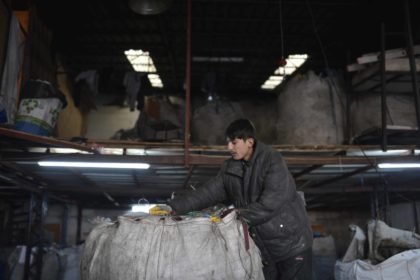RASC News Agency: In a fresh blow to the Taliban’s already fragile image of control, the Afghanistan Freedom Front (AFF) has claimed responsibility for a targeted attack in the Afghanistan capital, reportedly killing one Taliban fighter and wounding another in an operation that struck at the heart of the group’s intelligence apparatus.
The resistance movement announced on Sunday, November 2, that its forces had executed a precision night raid in the Bustan Road area of Kabul’s 17th Police District, targeting a vehicle affiliated with the Taliban’s intelligence directorate. According to the group’s statement, the operation specifically aimed to eliminate the district intelligence chief, whose car was “directly hit” during the attack.
A brief video released alongside the announcement captures bursts of automatic gunfire followed by a short explosion apparently the moment the Taliban convoy was ambushed. The AFF confirmed that its unit completed the mission “without casualties,” successfully withdrawing from the area before Taliban reinforcements arrived.
The Afghanistan Freedom Front, composed largely of former national army officers, special forces, and disillusioned civilians, describes its mission as a “struggle for freedom and justice against the Taliban’s despotic regime.” Over recent months, it has claimed responsibility for a series of coordinated attacks in Panjshir, Kapisa, Parwan, Baghlan, Kunduz, Takhar, and Kabul, signaling a widening arc of armed defiance.
Its operations though smaller in scale compared to the wars of the past carry immense symbolic weight. They demonstrate that, despite the Taliban’s sweeping propaganda about nationwide stability, resistance is not only alive but expanding.
“The Taliban have turned Afghanistan into an open-air prison,” said one AFF field commander, speaking to Rask News from an undisclosed location. “Our operations are not acts of vengeance; they are acts of defiance proof that no tyranny is permanent.”
Predictably, Taliban officials dismissed the incident as “fabricated propaganda” circulated by “foreign-backed dissidents.” Such statements have become a routine reflex from the group’s leadership, who consistently deny incidents that expose the hollowness of their claim to “complete security.”
Yet, eyewitnesses in Bustan Road described scenes that contradict official denials. Residents reported hearing gunfire and explosions late into the night, followed by Taliban units arriving only after the attackers had vanished. “They raided nearby homes and detained several young men,” one local resident told Rask News. “But everyone knows the Taliban rarely catch the real culprits they just spread fear among civilians.”
Even within Taliban ranks, whispers of fractures and disarray are growing. Multiple reports suggest internal disputes among commanders, especially between the intelligence directorate and the Ministry of Interior, over the handling of Kabul’s deteriorating security situation. Analysts say this lack of coordination is leaving the capital increasingly exposed to insurgent tactics.
Since their return to power in 2021, the Taliban have repeatedly proclaimed that Afghanistan is “safer than ever.” However, reality paints a starkly different picture: a nation beset by targeted killings, explosions, robberies, and covert armed resistance.
“Every attack like this shatters the illusion of Taliban control,” said a senior security analyst based in Doha. “The group’s so-called intelligence network is riddled with incompetence, corruption, and fear. They can no longer distinguish between their enemies and their own disillusioned members.”
Civil society activists echo similar sentiments, accusing the Taliban of prioritizing repression over reconstruction. While the group boasts about security, its own commanders are being hunted in the streets of Kabul often by the same networks it once sought to destroy.
Experts warn that the pattern of such attacks reflects the reemergence of an urban guerrilla movement a phenomenon that could push Afghanistan toward a new, more unpredictable phase of conflict. Unlike previous wars fought across mountain fronts, today’s insurgency thrives in backstreets, safe houses, and digital channels.
“These are not isolated attacks,” said a retired Afghanistan’s colonel now living in exile. “They are tests each one probing Taliban defenses, learning their routines, exposing their weaknesses. It’s the beginning of a long urban resistance, and Kabul will be its epicenter.”
The Taliban’s struggle to contain these operations underscores a deeper crisis of legitimacy. With growing divisions among its ranks, dwindling public trust, and the absence of any inclusive political process, the group faces not just a security threat but an existential one.
Observers note that disillusionment with Taliban rule is spreading even among traditional supporters. Economic collapse, international isolation, and the relentless suppression of women’s rights have eroded whatever moral authority the movement once claimed. In many communities, resentment simmers just below the surface.
The AFF and other resistance factions are exploiting this discontent, portraying themselves not as remnants of the past, but as the seeds of Afghanistan’s rebirth. While their organizational capacity remains limited, their message resonates deeply among a population increasingly suffocated by Taliban control.
“The Taliban promised peace,” said a Kabul-based academic who requested anonymity. “But peace without freedom is merely silence under fear. And fear never lasts forever.”
As night falls over Kabul, the sound of gunfire and the echo of small explosions have once again become part of the city’s uneasy rhythm. For the Taliban, these attacks represent more than tactical losses they are psychological defeats, reminders that their empire of fear is neither absolute nor eternal.
Each strike by the resistance, however modest, chips away at the narrative of invincibility that the Taliban desperately cling to. Behind their rhetoric of control lies a government haunted by the very instability it once vowed to end.
Afghanistan, it seems, is entering a new chapter one written not in the grand battles of the past, but in the silent defiance of those who refuse to surrender to tyranny.
“They rule by terror,” said one Kabul resident quietly. “But the night no longer belongs to them.”






